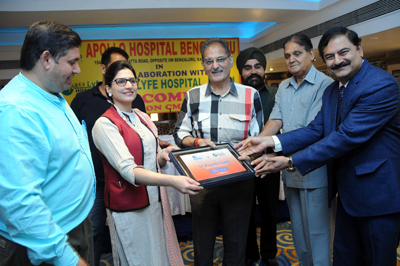
Excelsior Correspondent
JAMMU, Aug 25: Maxx Lyfe Hospital, Jammu in association with Apollo Hospital organized a CME on ‘breast cancer’, here today.
More than 200 doctors of different specialities participated in the CME, which was inaugurated by Speaker, Legislative Assembly, Kavinder Gupta, who was the chief guest on the occasion.
Click here to watch video
Dr Shabnam Bashir, Associate Consultant Oncosurgery, Robotic Colorectal Cancer Surgeon, Apollo Hospitals, Bangalore was the guest speaker. She said key to fight cancer lies in primary prevention, early diagnosis based on awareness of early signs and symptoms and population-based screening improve survival, particularly for breast, cervical, colorectal, skin and oral cancers.
“Based on the data between 2010 and 2012, it is suggested that at some point during their lifetime approximately 39.6 per cent of women and men will be diagnosed with cancer. In India, it is estimated that 14.5 lakh people are living with the disease, with over 7 lakh new cases being registered every year and 5,56,400 deaths which are said to be cancer related. An estimated 71 per cent of all cancer related deaths are occurring in the age group between 30 to 69 years”, she added.
While lung, colorectal, pharynx, stomach, head and neck, and liver were the five most common sites of cancer diagnosed among men in 2012; for the same period, the five common sites of cancer diagnosed among women were breast, ovary, lip and oral cavity, lung and cervix.
She said it is estimated that for every two women newly diagnosed with breast cancer one dies, while every 8 minutes one woman dies of cervical cancer. Being the third largest cause of cancer deaths in India, it accounts for nearly 20 per cent of all cancer related deaths. It generally affects the 21 to 67 age group, with the median age of occurrence being 38 years.
“As compared to the urban women, rural women are at higher risk of developing cervical cancer. Since survival rates improve if the condition is diagnosed and treated early, screening for cervical cancer is important”, she added.

